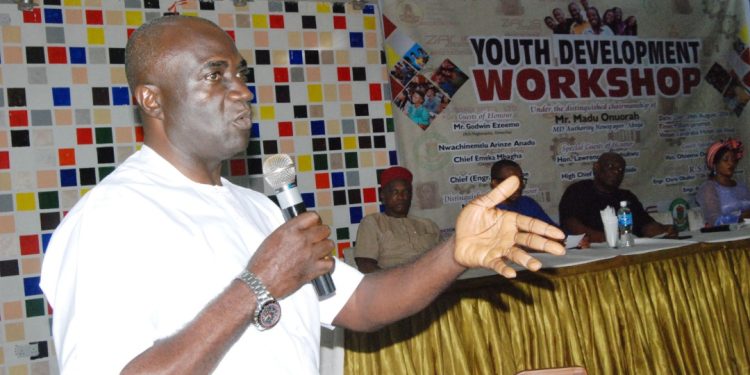I greatly appreciate the leadership of the Anambra State Towns (People) Association (ASTPA) Abuja for organising this worthy event. And it is not a surprise as ASTPA has been in the forefront of bringing together citizens of the State for cultural and social renewal every year. This yearly event that has been much sought after in Abuja by Anambra citizens bring all of us together and help us to understand ourselves thereby generating the needed brotherhood and cooperation.
For our children and youths who are here today, I once again welcome you. Please, note that as part of this workshop, there are things you need to know. This will help you to fully appreciate who you are and what the future offers you. Yes, there are certain things you have no hand in how they came to be. One of them is to whom or where you were to be born to and what ethnic group or country you were born into. And so, for these areas, you should have no apologies for or to anyone.
Yes, as Igbos, there should be no regrets. This is because being from Anambra State should be an additional badge of honour as an Igbo. This means that you must be proud of your heritage. Instead of denying your Igbo(ness) and worry about what jokes others will cast about you because you are Igbo, please, use the Igbos natural traits of independence, hard work, resourcefulness, never-say-die spirit and single-minded focus on goals to surmount every barrier on the way. You will see some of the statistics later.
Secondly, you were all born in a country called Nigeria, a country that once was Africa’s fastest growing and largest economy. It is a country blessed by God with vast natural resources and mineral reserves. Paradoxically, Nigeria has the largest number of children in the world who are not being educated, with the Permanent Secretary, Federal Ministry of Education, Alhaji Adamu Hussaini, saying that it was “sad to note” that Nigeria had 10.5 million children out of school.
To make matter worse, Nigeria has now taken over as the nation with the highest number of extremely poor people, a report by American Brookings Institution has shown. Before now, India, with a population of 1.324 billion people, used to hold the position. Please note that Nigeria’s population is estimated to be 200 million. Part of the report read: “At the end of May 2018, our trajectories suggest that Nigeria had about 87 million people in extreme poverty, compared with India’s 73 million. What is more, extreme poverty in Nigeria is growing by six people every minute, while poverty in India continues to fall.”
In March, the International Monetary Fund said Nigerians are getting poorer, a claim dismissed by the government.
Let’s break these figures home. According to a World Bank poverty statistics on Nigeria, the poverty rate in South West is 19.3%, South South – 25.2%, South East – 27.4%, North Central – 42.6%, North East – 76.8% and North West – 81.1%.
At the bottom 10 are the usual drags on the nation’s development: Kano – 76.4%, Gombe – 76.9%, Taraba – 77.7%, Katsina – 82.2%, Sokoto – 85.3%, Kebbi – 86.0%, Bauchi – 86.6%, Jigawa – 88.4%, Yobe – 90.2% and Zamfara, 91.9%.
The good news for Anambra is that on State by State basis, it has 11.2% poverty level. Lagos leads with 8.5%. Other Igbo States include Imo State – 19.8%, Abia State – 21.0%, Enugu State – 28.8% and Ebonyi, 56.0%. Our FCT (Abuja) has 23.5% poverty level. Please, note that there is a coloration between the level of education and the level of poverty. And there is also synergy between the cultural values of a people and their level of poverty.
Succinctly, American football player, coach and analyst, Louis Leo Holtz, states: “I follow three rules: Do the right thing, do the best you can, and always show people you care. You’ve got to make a sincere attempt to have the right goals to begin with, then go after them with appropriate effort, and remember that you can’t really achieve anything great without the help of others.”
Also note that in May 2007, the former Minister of Federal Capital Territory (FCT) and now Governor of Kaduna State, Mallam Nasir el-Rufai declared that Igbos have acquired about 73% of the landed property in Abuja. He jokingly said that Igbos should take Abuja as the sixth State of the Southeast in view of the Igbos dominance of the real estate sector of the FCT. Said El-Rufai: “68 percent of the land allocations in the FCT belongs to the 19 Northern States. But in actual land ownership, 73 percent belong to the Igbos, with the most aggressive in land ownership belonging to the indigenes of Anambra State.”
So, as you can see from the statistics, you have a goodly heritage to build on. These figures present to you, our young friends and children, both hope, challenge and opportunity for you. It means that despite the vicissitudes of life and the challenges facing us in Nigeria of today, there are opportunities for you to showcase your skills and give leadership to others thereby setting the pace for tomorrow’s Nigeria.
But to lead the pack, you must be willing to take hard decisions. You must do away with these trending polished-though-unrealistic lives many of us present on social media. Yes, what we do present on Instagram and Facebook of beautiful and shiny personas who have never and would never experience failures must be quickly jettisoned. This is important because on the way to success, challenges and risks are part of the process. You must never be afraid of challenges as challenges are part of success.
Another American, Zander Fryer, said if you want to lead and be successful at it, “Get comfortable getting uncomfortable. Most people fear discomfort, but discomfort just comes from doing something unfamiliar. When we do the unfamiliar, it becomes familiar. Then, it’s comfortable. So, when you are uncomfortable, it’s just because you’re growing and learning.”
General Colin Powell, the first black American National Security Adviser and Secretary of State, stated that “there are no secrets to success. It is the result of preparation, hard work, and learning from failure.” So, you can now see why you should not be afraid of failure. If you are innovative, then failure is a positive learning experience as you break into uncharted territories through being resilient. Note that overcoming failure is a pre-requisite requirement for greatness. The way you manage failure or challenges shows how far you can go in life in achieving your life goals. Managing challenges or failure most often prepares well you for managing success.
In addition, pay great attention to your relationship with God. Your life must be formed on a solid base of spirituality. Your life must be anchored as embedded in the Laws and Commandments of God.
For example, God told the Israelites fresh from Egypt: “Do not seek revenge or bear a grudge against anyone among your people but love your neighbour as yourself. I am the Lord” (Lev. 19:18). Today, Christ-followers are to “be kind and compassionate to one another” (Eph. 4:32). And the reasons we are to show kindness have not changed: It is because of who God is and what He has done for us. We are to “follow God’s example … and walk in the way of love” (5:1-2).
Succinctly, American football player, coach and analyst, Louis Leo Holtz, states: “I follow three rules: Do the right thing, do the best you can, and always show people you care. You’ve got to make a sincere attempt to have the right goals to begin with, then go after them with appropriate effort, and remember that you can’t really achieve anything great without the help of others.”
In concluding these remarks, please, don’t be afraid of taking risk. Always operate out of your comfort zone. Do things along the path of success that you’ve not done before. Never forget that as you aspire to fill the yawning gap in the quest for skill and leadership in Nigeria, the future only belongs to those who are willing to sacrifice the pleasures of the present in order to gain it. Greatness is not a product of convenience. The greatness of tomorrow begins with the sacrifice of today.
As a sage noted, for a great future, don’t fail to invest, don’t fail to sacrifice, don’t fail to endure, don’t fail to persist and don’t fail to believe. The future truly belongs to those who can foresee it and give all it takes to get there. If you don’t remember anything I have said so far, don’t ever forget that “Greatness in life is not a product of convenience.” It takes sacrifice.
Ndi be anyi, udo diri unu.







